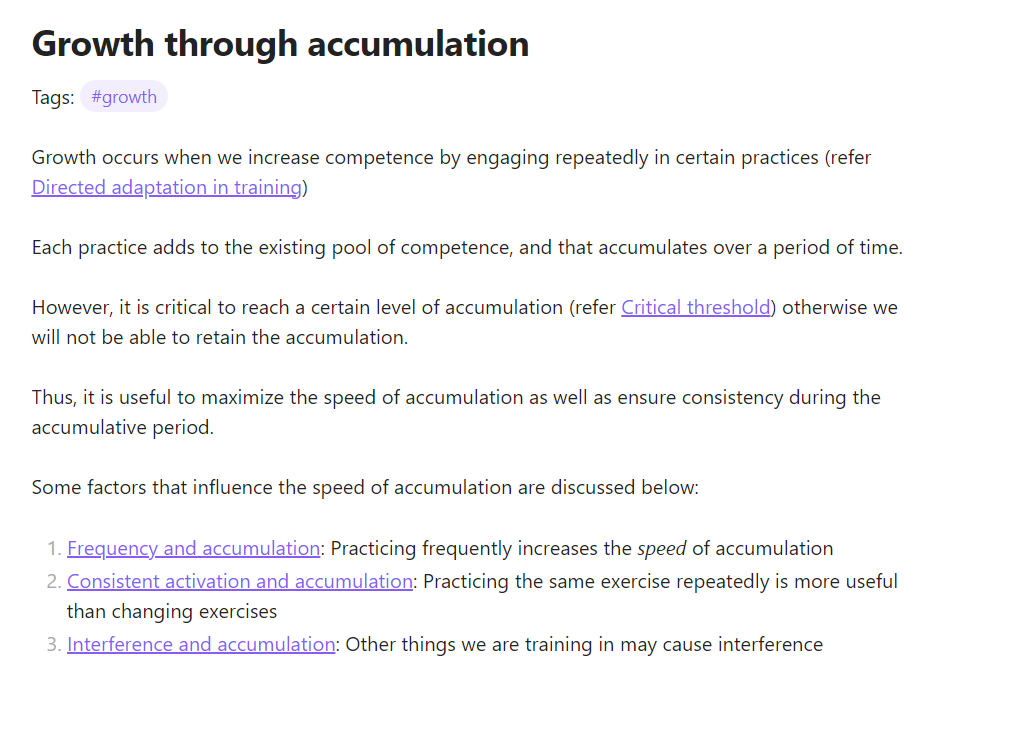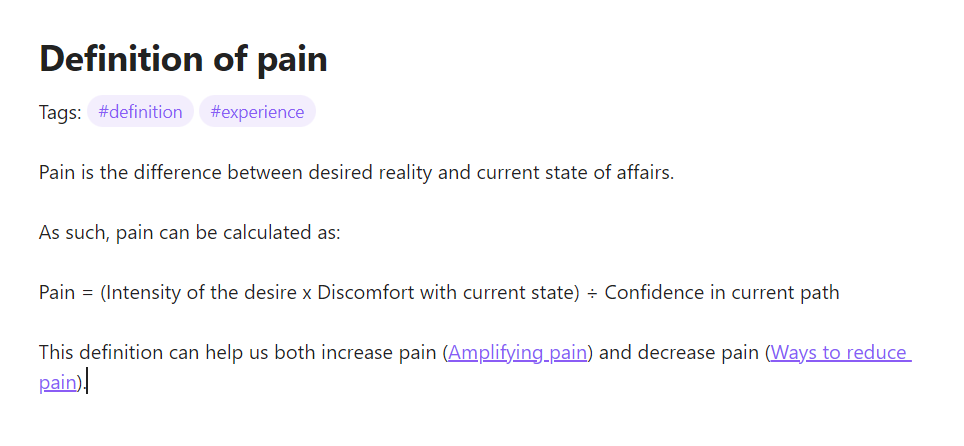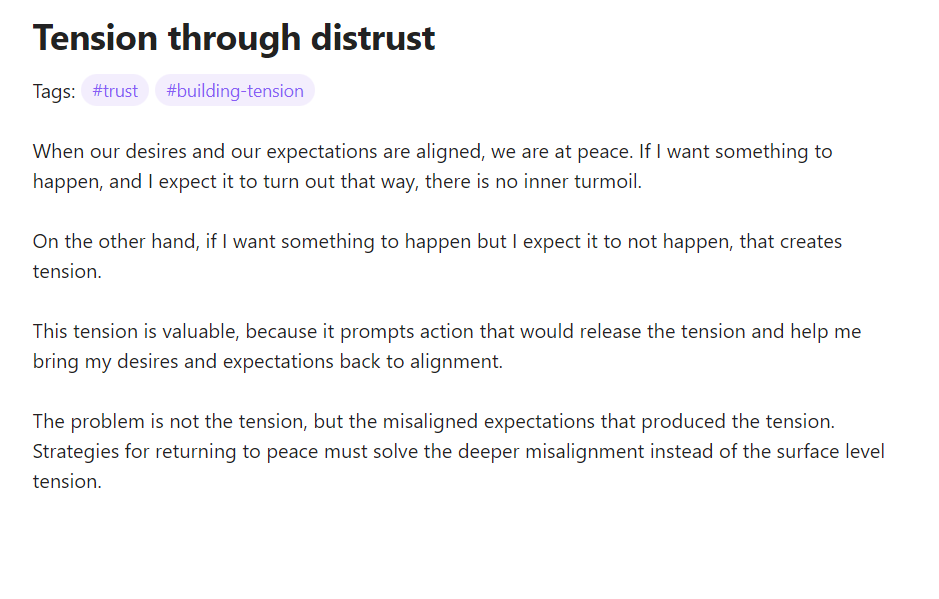What is evidence? How much reasoning do I need to Zettel?
Hi! I shared one of my Zettels and a query around it 2 weeks ago and I received some feedback that forced me to reflect on some fundamental questions.
The most pressing of which is - what exactly constitutes evidence?
Zettelkasten is a way to express my thought process, so if my thought and reasoning processes are flawed then I will end up with subpar knowledge. Requesting you all to lend your guidance and help me reach a deeper level of understanding.
Adding some more context to the situation -
In one of my notes, I made a claim that growth follows certain principles. One of which is accumulation - that repetitions of a task add competence (see attached note) 
Now - this is based on simple observations such as regularly practicing a new language will add on proficiency, regularly working out will increase muscle growth.
However, I am not linking any studies or scientific papers to this claim.
When dealing with matters of such abstract concepts - for example, growth, justice, intelligence, and so forth my style is to simply make a claim "Growth is X" and then let it just be.
For example, look at the below note about pain (one of the notes I'm most proud of, btw)

Now this definition is something that I came up with through reflecting upon my sales calls and it intuitively makes sense to me.
But there is no specific research about it. Perhaps later I will combat my own thinking of that note and point out contexts within which my initial premise does not hold true.
Take another note like this - 
Again - it is based on what intuitively makes sense to me. And I find it reasonable and useful too. But it does not have any proper 'backing' to it.
In the Layers of Evidence post (https://zettelkasten.de/posts/layers-of-evidence/) Sascha discussed description of data as the first step. However, in these notes I directly make claims about the way something is, and a lot of the things I make into notes stem from personal observations of individual events or just direct conclusions that make sense to me.
While anecdotes are not considered good evidence, I also don't know how to replace them with something tangible.
Are there any problems in this way of processing ideas? I wish to be aware of the fallacies or problems inherent in such a way of dealing with knowledge, so that I avoid erroneous thinking.
Additionally - a second and related question - I understand philosophy likely has lot of rules and frameworks around reasoning (eg ad hominem, loaded question, etc.) but I have very little formal knowledge of it. Mostly I am guided by intuitive and gut reasonings and many times if I try to articulate this gut feeling I end up with something similar to what might have formally included as some kind of philosophical rule as well.
How important is it for me to formally understand these rules of logic in order to write my Zettel? And what would be the Pareto distribution here ( 20% of the rules/philosophies that will give me 80% of the improvement in thinking better)
Howdy, Stranger!
Comments
@AayushPriyank
Writing down your thoughts about a concept could be a first step in creating a zettel (I say "could be" because it's not the only way to start). That process will help to focus and clarify your current thinking on the topic.
A logical next step would be to research the concept using available resources, such as web searches, identifying and reading articles and books, watching videos, listening to podcasts, taking a course, etc. That will provide you with evidence of varying reliability. Any evidence you feel carries some weight can be documented in your zettel. At the same time, you can further process your zettel to update and improve its content. This is obviously a cyclic process which may continue for some time. You may never be finished with a zettel, but it should improve over time.
You should be careful to avoid staying in the echo chamber of your own mind or of a small group of people with the same opinion. The broader and deeper you make your search, the more likely you will be to encounter ideas that will improve your thinking on a particular topic. Don't be afraid to read the thoughts of others that run contrary to yours.
Persist over time, and you will find that relevant material serendipitously appears. In my graduate student days, when I encountered a roadblock in researching a particular topic, I would wander the stacks of our university library, sometimes for hours, expanding my physical search from a specific topic located at one spot in the library to adjacent books in the stacks. In a library, the immediately related material is found close by. As one travels further and further away, the material becomes less obviously related but sometimes more relevant to your search. And I would talk to professors with known expertise in an area; they could recommend other related knowledge areas to research, to gain additional insight into my topic of interest. This process can be directly translated into today's world and tools. And it has the advantage of creating both new zettels and new connections for your ZK.
Your question is really about the learning process - how do you educate yourself about a particular topic? You can ask a person with little knowledge about a specific topic to write down their ideas, and many will be able to do so. But is that the end of their learning? Hopefully it is just the beginning of their learning journey.
I think it really depends on the purpose of your Zettelkasten.
The stronger you need the theories you want to develop, the stronger you need your evidences and the logic process you use to compose with your hypotheses, so the more you have to search and study.
If you want to write a book or a paper about a research in a knowledge domain, the value of your work is proportional to the strictness of your arguments and evidence.
If you have lower level purposes, you can relax your requirements.
My Zettelkasten has today some thousands of notes, I can't have thousands of "proved theorems", it would be infeasible.
Some of them that I use for my work need a high level of truth, so they have a pretty strong support structure (documented cases and examples, principles recognized as valid in the field of knowledge they belong, supporting literature), even if I 'm never rigorous and formal like a scholar or a researcher: I don't need this strictness for my projects and tasks.
Others have only an anecdotal supports, I've observed and experienced on myself an effect. Others are only supported only by my opinions and feelings.
They are all useful, the support they have meets the requirements of their use.
But when needed, the third and second group can scale to an higher degree of truth with a better study and research, why not.
Sometimes being able to cite a couple of my experiences and daily episodes in support of a theory can be enough for my uses, other times it's not enough at all.
For example, many of my "how to do a zettelkasten" principles are based on my personal experiences of tried things and personal interpretation of theories, my main purpose is not to develop the best zettelkasten theory for everyone but only the zettelkasten that works for me, so it is enough. For some critical parts, anyway, I've made a really deep study,
looking for and evaluating every possible facet of the topic.
The important thing, for me, I need to have clear
For example, considering this same post of mine as a "theory".
It is only based on my personal feelings, experiences and opinions. I have to be aware of it.
It is not supported by a rigorous search in the field, I didn't do any research.
It is strictly bound to the use cases of my zettelkasten. (a zettelkasten for not scholar purposes).
So, I can't sell you as an universal rule about how to develop the evidence into a zettelkasten.
I can't write, at this level of development, a serious paper about it.
But it is still useful for me.
It makes me think.
It allows me to compare my ideas with you and other guys here about the topic.
It allows me to meet, If I'm lucky, more serious evidences than mine that allow me to improve my perspective. It can grow and become stronger.
So, at this moment, I can consider this a useful zettel even if it doesn't have an evidence more solid that my feelings. Its truth is enough for the context for which is born this evening, simply sharing our thoughts about the topic.
The emboldened sentence gives away your need.
A more general way to phrase the question is: How reliable should the information be that I base my actions and beliefs on?
There are two lines of thinking:
So, the question cannot be answered by referring to the Zettelkasten Method, but only by referring to the context of your work.
PS: I'd suggest to always separate pain and suffering.
I am a Zettler
@Sascha Very curious about how you would go about developing those initial lines of thought in theory once you do more research.
Let's say we start with
202409261044 Trust authorities for investment when you don't know betterto take your example.Then, in a theoretical line of research (I don't actually know, bear with me), you come across several articles and scandals that actually tend to shift your gut in a different direction.
How would it work in practice with your Zettelkasten?
Do you add, say
202409261046 Authorities don't seem to know better regarding investment, and link both to each other, writing for example in the first one "Actually, it seems it's not a good idea after all, I revised this, see 202409261046"?Later on, when developing upon those thoughts, how do you avoid linking to "obsolete" ideas, say, make sure you link to 202409261046 instead of 202409261044? Is it a simple matter of checking the Zettels to make sure of what's inside? I guess I'm worried about the proliferation of ancillary ideas and variations of the same evolving thought / wording as you evolve your understanding about a subject, to the point where it becomes unwieldy.
I know everyone does things differently; I'm just looking for an empirical example of your own recommendations to further my own thinking 🙂
"A writer should write what he has to say and not speak it." - Ernest Hemingway
PKM: Bear, tasks: OmniFocus, production: Scrivener / Ableton Live.
Mh. It sounds to me that this is a procedural idea which would instruct me how I use my Zettelkasten. But it would be absurd to develop a manual for each domain of interest that I'd need to regularly update, review etc.
In that case, I'd just make the decision and then slowly build on the already existing material. The notes that merely cite authorities would be updated on demand and improved by additional research.
Independent from the above use case, all of your processes are present in my workflow, since it is a case-by-case decision. Sometimes, I update the content of the note and update the links to the note. Sometimes, I create a new note and refer to the old note from the new one as a fallacy, if I want to hold on to the exploration of dos and don'ts.
I am a Zettler
Thank you @Sascha . I guess I struggle to see how it would work in practice… In my example, I believe the very first Zettel would serve as an "anchor point" in the consideration that I would not have any other financial material inside it.
So you improve notes from time to time if the old idea is still somewhat sound (additional proof for instance), and keep fallacies only if they help you trace your reasoning, otherwise they serve no point. Do I get that right?
Let's take a less weighted example: if I was an independent coder, I would update and possibly rewrite notes entirely regarding best practices and language evolutions such as
How to connect to this format of databasebecause the old way is no longer relevant in my practice. But if I was a historian of computer science, I would keep the note and create a new one for the new way, showing the evolution of the field.Do I get that right?
This really showcases how personal the method and someone's Zettelkasten actually is. It's also fascinating to me as this really emphasizes that you do not Zettel for the heck of it, you do it for the purposes that you have.
"A writer should write what he has to say and not speak it." - Ernest Hemingway
PKM: Bear, tasks: OmniFocus, production: Scrivener / Ableton Live.
These things are usually not pages-long introductions, so I actually keep the old instructions for
SomeDatabase v1around (at the bottom) because the info is still valid for the old version, and prepend an adjusted copy for v2/v3/...After a couple of iterations and years, I do delete the old ones.
If instructions are long, I don't do it in the same Zettel but extract the versioned instructions instead, keeping the old ID as the hub (or current version).
Timeline, with 4-digit ideas for clarity:
Why do it this way?
Because with web development in particular, you often juggle different environments, with version X locally, version Y on server A, and version Z on server B, and then you need to use the right instructions in each context, so there's value in keeping "
N-3" (where N is the current version) aroundAuthor at Zettelkasten.de • https://christiantietze.de/
I couldn't agree more!!
Thank you @ctietze , makes a lot of sense. I'm happy that my gut instincts as to how to tackle things are getting more and more to the point of the method.
This also reveals how much we need to be considerate in our information intake – or that we must be prepared to let some things slide. Zetteling is time-consuming, and we must accept that there are many things that will never make it in there (this is especially important for OCD and ADHD brains). We must turn our attention consciously to subjects we research or maintain actively, and in turn, that means knowing yourself and what truly matters to you in order to know what to let slide.
"A writer should write what he has to say and not speak it." - Ernest Hemingway
PKM: Bear, tasks: OmniFocus, production: Scrivener / Ableton Live.